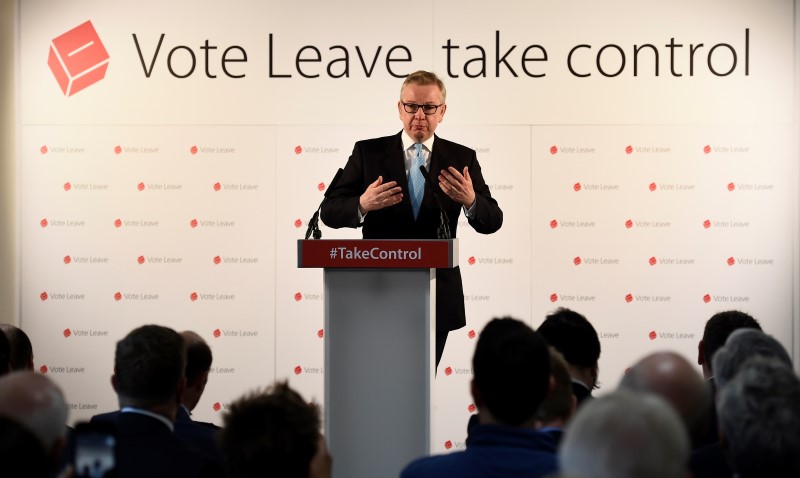By Estelle Shirbon
LONDON (Reuters) - A government minister campaigning for Britain to leave the European Union said on Friday he was glad not to have economic authorities on his side because they had been wrong about the euro and had failed to predict the global financial crisis.
Justice Secretary Michael Gove also branded the 28-member bloc a "job-destroying machine" that had hollowed out communities across Britain, citing the failure of his own father's fishing business which he attributed to EU quotas.
Britons will vote in a referendum on June 23 on whether to remain in the EU, a choice with far-reaching consequences for politics, the economy, trade, defence and migration flows in Britain and far beyond.
The debate has split the ruling Conservative Party, with Prime Minister David Cameron leading efforts to keep Britain in the club, and senior figures like Gove and former London mayor Boris Johnson heading the campaign for a "Leave" vote.
The International Monetary Fund, Bank of England, Confederation of British Industry and numerous other organisations have warned a British exit, or Brexit, would harm the economy.
Challenged on why the "Leave" camp had not received similar backing from economic authorities, Gove said those warning against a Brexit had once advised Britain to join the European single currency. In Britain, the euro is widely seen as an experiment gone badly wrong that the country did well to avoid.
"I'm glad that all these organisations are not on my side," Gove said during a live interview and question-and-answer session with members of the public on Sky News television.
Gove's appearance mirrored a similar programme featuring Cameron on Thursday night, during which he was grilled on his failure to achieve his target of bringing immigration down to below 100,000 arrivals per year.
IMMIGRATION V ECONOMY
Immigration is a major concern for many voters and the "Leave" camp argues that Britain cannot control it because of EU freedom of movement rights. The issue is seen as the main weakness of the "Remain" camp.
The economic argument, on the other hand, is widely perceived as a problematic issue for "Leave" campaigners like Gove, who was quizzed during the programme by voters on what would happen to jobs and house prices if there was a Brexit.
"The truth about the European Union is that it is a job-destroying machine," he said, arguing that Britain would have enhanced opportunities for growth and for trade deals with the likes of China, India and the United States outside the bloc.
A long list of foreign leaders, including U.S. President Barack Obama, have said they wanted Britain to stay in the bloc, but Gove dismissed those interventions, saying those leaders would never cede sovereignty in the way required of EU members.
"Don't pay attention to what they say, pay attention to what they do," he told the audience.
Gove also attacked U.S. banks Goldman Sachs (NYSE:GS) and JP Morgan, which have donated funds to the "Remain" campaign, saying they were doing very well out of the European Union and portraying them as part of an elite that cared little for ordinary people.
"Banks like JP Morgan and Goldman Sachs said that Greece could enter the euro and they knew that that was wrong. Banks like JP Morgan and Goldman Sachs spend millions lobbying the European Union in order to rig a market in their favour."

JP Morgan's Chief Executive Jamie Dimon told British staff of the bank earlier that a Brexit would mean fewer jobs in their country and more in Europe.